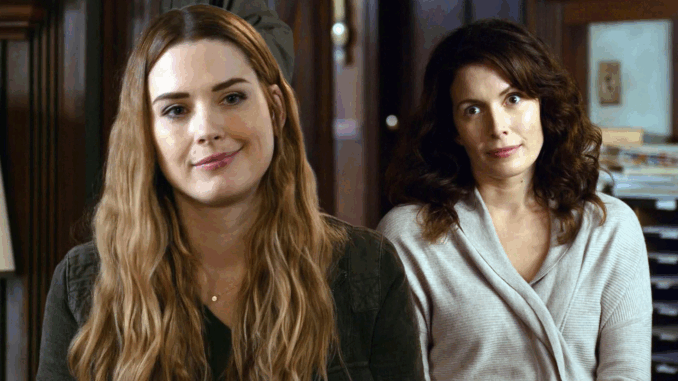
Unmasking Redwood’s Shadow: Virgin River Book Series Faces Scrutiny for Allegedly Sexist and Vulgar Content
While the Netflix adaptation of Robyn Carr’s Virgin River book series has garnered a massive following for its heartwarming stories and charming characters, a growing number of fans who have ventured into the source material have expressed significant disappointment and even outrage. The core of their criticism? Allegations of sexism, vulgar language, and “off-putting” romantic storylines that starkly contrast with the often more sanitized and emotionally nuanced portrayal on screen. This divide between the show and the books has sparked heated discussions online, with many viewers finding the literary origins of their beloved series to be problematic and difficult to stomach.
The primary concerns raised by readers center on the depiction of male-female interactions, the objectification of women, and the inclusion of storylines deemed inappropriate or even “creepy.” These criticisms paint a picture of a book series that, for some, undermines the very charm and comfort they find in the Netflix adaptation, leading to a stark preference for the on-screen version.
“Sexist Language and Objectification”: A Core Grievance Among Readers
One of the most frequently cited issues is the language and internal monologue attributed to male characters in the books, which many readers describe as overtly sexual, objectifying, and even possessive towards women. Phrases and descriptions that reduce female characters to their physical attributes and express a crude sense of entitlement have been highlighted as particularly jarring and inconsistent with the more respectful dynamics often portrayed in the show.
Fans have pointed to instances where male characters’ thoughts and dialogue are described as vulgar and focused solely on the physical, lacking the emotional depth and genuine connection that characterize the romantic relationships in the Netflix series. This perceived sexism has led some readers to abandon the books altogether, finding the portrayal of male-female interactions to be deeply off-putting and contrary to their expectations based on the show.
“Creepy” and “Inappropriate” Storylines: Disturbing Content for Some Fans
Beyond the general tone of male-female interactions, specific storylines within the books have also drawn significant criticism for being “creepy” or inappropriate. One particularly contentious point revolves around the relationship between the teenage characters Lizzie and Ricky. Some readers have expressed discomfort with the level of sexual detail and the power dynamics portrayed in their interactions, especially considering Lizzie’s young age in the earlier books.
The way the narrator and other characters discuss Lizzie has also been flagged as problematic, with some readers finding the descriptions to be overly sexualized and bordering on inappropriate. This has led to considerable unease among viewers who appreciate the more sensitive and less explicit portrayal of teenage relationships in the Netflix adaptation.
The Stark Contrast with the Netflix Adaptation: A Source of Confusion and Disappointment
The significant differences in tone and content between the Virgin River books and the Netflix series have left some fans feeling conflicted and even misled. Many viewers who fell in love with the show’s heartwarming atmosphere and relatively chaste romantic portrayals were surprised and disappointed to discover the more explicit and, in their view, problematic nature of the source material.
This disparity has led to discussions about the liberties taken by the showrunners in adapting the books for television, with many fans expressing gratitude for the changes made. The Netflix adaptation is often praised for its focus on emotional connection, character development, and a more nuanced exploration of relationships, in stark contrast to what some readers perceive as the “vulgar” and “sexist” tendencies of the books.
A Divided Fanbase: Those Who Can’t Stomach the Books vs. Those Who Accept Them
While a significant portion of Virgin River fans have voiced their strong disapproval of the books’ content, it’s important to acknowledge that the fanbase is not entirely unified on this issue. Some readers have defended the books, suggesting that they belong to a different genre or cater to a different audience with different expectations for romance novels.
Some argue that the books offer a more “adult” or “raw” portrayal of relationships, while others simply enjoy the stories regardless of the elements that others find problematic. This division within the fanbase highlights the subjective nature of literary taste and the varying expectations viewers bring to both the books and the television adaptation. However, the volume and intensity of the criticisms regarding sexism and vulgarity cannot be ignored.
Conclusion: Navigating Redwood’s Literary Divide
The stark contrast between the beloved Netflix adaptation of Virgin River and the criticisms leveled against the original book series for alleged sexism and vulgarity presents a fascinating case study in adaptation and audience reception. While the show has cultivated a global fanbase with its heartwarming stories and charming characters, many viewers who have delved into the books have found the content to be “off-putting” and inconsistent with the tone they appreciate on screen.
The allegations of objectification, inappropriate portrayals of teenage relationships, and generally “sexist” language have led to strong negative reactions and a clear preference for the Netflix adaptation among a significant portion of the fanbase. As the Virgin River universe continues to expand, this divide highlights the importance of considering evolving audience sensibilities and the potential for adaptations to reshape and refine the source material in ways that resonate more positively with a broader audience. The “Redwood Rumble” between book purists and show enthusiasts over these issues is likely to continue as more viewers discover the contrasting worlds of Robyn Carr’s novels and the beloved Netflix series.
